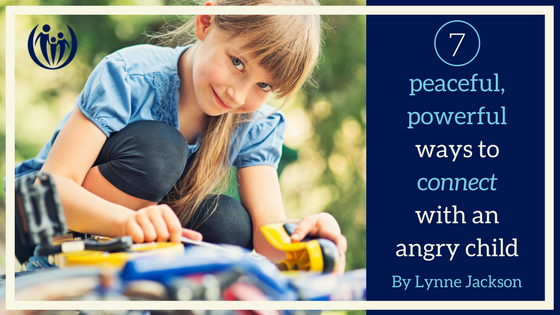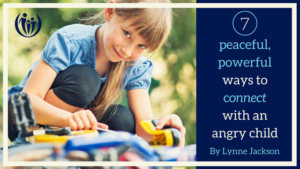
7 Peaceful, Powerful Ways to Connect with an Angry Child
Everyone would agree that loving our children is one of the most important things a parent can do.
But sometimes expressing that love isn’t as easy as it sounds. Sarafina wrote about a breakthrough she had in learning to connect with an extremely angry child:
One day my 7-year-old daughter, Kendra, absolutely lost it when her bike accidentally got broken. She screamed, hit, and yelled very hurtful words at me. In the past, I would have yelled back, strongly telling her, “That is not okay!!!” But I knew she knew it wasn’t okay, so I ignored the aggressive responses and prayed for guidance. I told her, “My heart needs to connect to your heart,” and I pulled her close and gave her a hug. She resisted initially and then seemed to melt into me. She started to kiss me on the cheek repeatedly and said, “I’m sorry Mom, I’m sorry.” When she was a little calmer she said, “I don’t know why I do these things – I just can’t control myself. I need help.” My calm response allowed her to really open up to me.
This was a breakthrough for both mom and daughter. It didn’t happen because Sarafina said a magic phrase or had magic methods. Her heart was for her daughter, and as she stopped to pray, she got insight into what Kendra truly needed. And what Kendra really needed was to feel connected to her mom.
An older child we know, who has gone through periods of intense meltdowns, once insightfully stated, “When I have those agitated, ready-to-blow days, the best way I can describe the feeling is ‘intensely alone.’” If that’s how a child is feeling, having a meltdown may be the best they can do to get a parent’s intense attention and feel “joined.”
If you have a meltdown-prone child who also may be feeling very alone in their internal stress, here are some practical idea starters to help you peacefully but powerfully connect when your child is out of control:
- Do – pray for wisdom, and Don’t – give your child an angry, controlling reaction! (which would escalate the meltdown.)
- Offer a hug.
- Express empathy in strong, simple sentences:
- “You love that bike!”
- “It’s so frustrating when something you really like gets broken!”
- “I feel that way too sometimes.”
- Introduce a different sensory experience
- Move to a different room
- Go outside/invite your child to talk about it while you go for a walk/play catch
- Grab paper and pencil and start to draw a picture of what your child is upset about
- Ask if she wants a back rub to settle her mind so she can solve her problem
- Find something to affirm
- “I’m so glad you’re telling me about your big feelings.”
- “I can tell that _______ (the issue she is upset about) is really important to you.”
- “You really care about people’s feelings and about what they feel about you.”
- You can shift to helpful questions as your child calms down, not when they are out-of-control upset.
- “How have you gotten through this in the past?”
- “How much and what kind of help do you need to solve this?”
- Afterward, put your focus on whatever your child did to calm down and work to solve her problem. This strengthens your child’s ability to calm down on their own as they feel more capable.
These are some good ideas to start — but just like Sarafina, you will need to listen to the Holy Spirit’s prompting about what response will best reach your child’s heart in a given situation.
Download our FREE in-depth ebook Helping Kids With Anger. It will provide thoughtful insights and creative ideas to help your struggling child.







